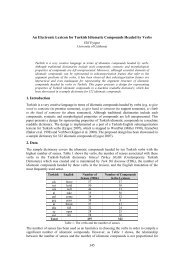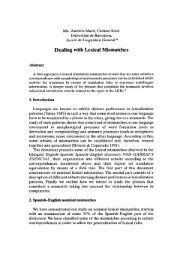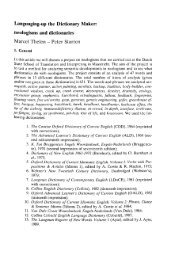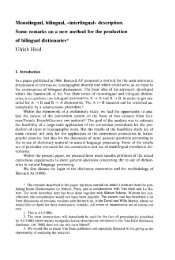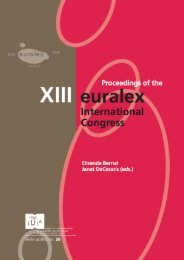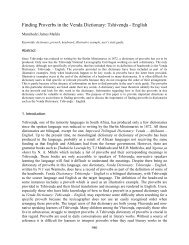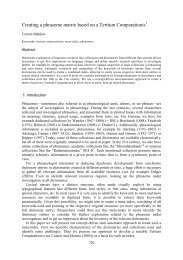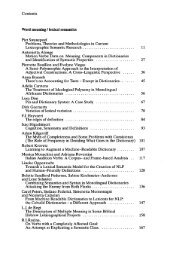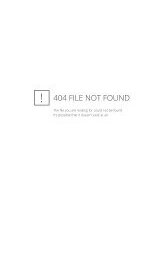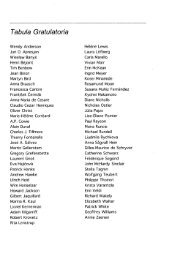Collocations in a New Bilingual Print and Electronic English - Euralex
Collocations in a New Bilingual Print and Electronic English - Euralex
Collocations in a New Bilingual Print and Electronic English - Euralex
You also want an ePaper? Increase the reach of your titles
YUMPU automatically turns print PDFs into web optimized ePapers that Google loves.
EURALEX 2002 PROCEEDINGS<br />
produce ... vt ... to ~ antibodies/red blood cells Antikörper/rote Blutkörperchen produzieren; to ~<br />
coaĽoil KohleAirdöl fordern; to ~ electricity Strom erzeugen; to ~ ideas/thoughts Ideen/Gedanken<br />
entwickeln; to ~ an illusion e<strong>in</strong>e falsche Vorstellung erwecken; to ~ noise Lärm verursachen; to ~ a<br />
noveMreport e<strong>in</strong>en Romar^Bericht schreiben [o verfassen]; to ~ an odour e<strong>in</strong>en Geruch absondern;<br />
to ~ a shadow e<strong>in</strong>en Schatten werfen; to ~ a state of hypnosis e<strong>in</strong>en Hypnosenzust<strong>and</strong><br />
herbeifflhren;<br />
Other collocations have an idiomatic feel to them but are very easy to translate. We <strong>in</strong>clude<br />
a selection ofthese <strong>in</strong> the dictionary:<br />
produce ... v/ ... to ~ top artists Spitzenkunstler[<strong>in</strong>nen] produzieren; to ~ a record/CD e<strong>in</strong>e<br />
CD/Schallplatte produzieren;<br />
piece... n... to break/smash/tear sth <strong>in</strong> [or <strong>in</strong>to] [or to] ~s etw <strong>in</strong> Stücke brechen/schlagen/reißen;<br />
question<strong>in</strong>g... adj... a ~ look e<strong>in</strong> fragender Blick;<br />
Degree ofRestrictedness<br />
<strong>Collocations</strong> can be more or less restricted: moot question, confirmed bachelor, adamant<strong>in</strong>e<br />
will, addled eggsfbra<strong>in</strong> are far more restricted than utter nonsense, high hopes, assorted<br />
flavors or healthy lifestyle which have a larger collocational range. The more restricted a<br />
collocation is, the more important it is to <strong>in</strong>clude it.<br />
wound ... adj ... a gap<strong>in</strong>g/open ~ e<strong>in</strong>e klaffende/offene Wunde; (a bleed<strong>in</strong>g/<strong>in</strong>fected/old ~ all not<br />
<strong>in</strong>cluded)<br />
confirmed ... adj ... a ~ alcoholic chronischer Alkoholiker; a ~ atheist e<strong>in</strong> überzeugter Atheist: a ~<br />
bachelor e<strong>in</strong>gefleischter Junggeselle; (a ~ reservation is not <strong>in</strong>cluded)<br />
recover ... vt... fóet back) one 's health etw zurückerlangen; sth lent etw zurückbekommen; one 's<br />
appetite etw wiedergew<strong>in</strong>nen; stolen goods etw sicherstellen; to ~ one's balance/composure se<strong>in</strong><br />
Gleichgewicht/se<strong>in</strong>e Selbstbeherrschung wieder f<strong>in</strong>den; to ~ consciousness das Bewusstse<strong>in</strong><br />
wiedererlangen, wieder zu Bewusstse<strong>in</strong> kommen; to ~ one's costs se<strong>in</strong>e Kosten decken; to ~ data/a<br />
directory/file COMPUT Daten/ e<strong>in</strong> Verzeichnis/ e<strong>in</strong>e Datei wiederherstellen; to ~ one's health wieder<br />
gesund werden; to ~ one's hear<strong>in</strong>g/sight wieder höraVsehen können; to ~ one's strength wieder zu<br />
Kräften kommen;<br />
The example, recover, shows various degrees of restrictedness <strong>and</strong> their representations <strong>in</strong><br />
PGE. Whereas lexical fields are written <strong>in</strong> italics after a short def<strong>in</strong>ition at the beg<strong>in</strong>n<strong>in</strong>g of<br />
the article, more restricted collocations are listed explicitly <strong>in</strong> semi-bold.<br />
Collocational Symmetry<br />
Another good reason for <strong>in</strong>clud<strong>in</strong>g full collocations is to disambiguate <strong>in</strong> the target language,<br />
thus giv<strong>in</strong>g the non-native a greater sense ofsecurity. Under "cavernous", it could be typical<br />
traditional lexicographic practice to <strong>in</strong>clude the collocate, hole, <strong>and</strong> translate cavernous <strong>in</strong><br />
this context as gähnend. However, the autosemantic Loch is required here to show the<br />
learner the correct selection <strong>and</strong> natural context ofgähnend ("yawn<strong>in</strong>g"). It also makes very<br />
much sense to have symmetry <strong>in</strong> the entry: a full collocation translated by a full collocation<br />
[Cop 1990]. This way, it is easier to anchor the collocation <strong>in</strong> the learner's memory.<br />
cavernous ... adj... ~ hole gähnendes Loch;<br />
800



